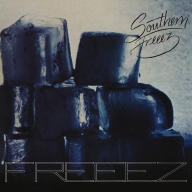Started and piloted by John Rocca, Freeez released their first singles in 1980 through the musician and producer's intentionally misspelled Pink Rythm label. The instrumental "Keep in Touch" and "Stay," uptempo jazz-funk cuts emphasizing bassist Peter Maas, also featured percussionist Rocca, drummer Paul Morgan, and contributions from keyboardist Jason Wright and guitarist Jean-Paul Bluey Maunick (the same year Maunick, formerly of Light of the World, launched Incognito). "Keep in Touch" was licensed to Pye subsidiary Calibre and reached number 49 on the U.K. singles chart. The band then recorded their debut album with new core member Andy Stennett on keyboards. Southern Freeez was released by Pink Rythm in late 1980 and was soon re-circulated by Beggars Banquet, a bigger independent known for acts such as the Lurkers, Gary Numan, and Bauhaus rather than bands inspired by the Blackbyrds. "Southern Freeez" itself, a Brit-funk classic fronted by guest vocalist Ingrid Mansfield Austin, spent 11 weeks on the U.K. chart in early 1981, peaking at number eight that March. The second single off the album, the predominantly instrumental "Flying High," reached number 35.
Sticking with Beggars Banquet, Freeez issued the boogie-flavored "One to One" in 1982 before Rocca, Stennett, and new drummer Everton McCalla (another Light of the World alum) linked with Arthur Baker, John Robie, and Jellybean Benitez, driving forces behind post-disco club music in New York. The partnership resulted in Freeez's biggest hit, "I.O.U," an electro touchstone with Rocca's yearning tenor as memorable as the high-tech production. In July 1983, "I.O.U." narrowly missed the top of the U.K. chart (trumped by Paul Young's version of "Wherever I Lay My Hat [That's Home]"), while in the U.S., its original pressing on Baker's Streetwise label crowned Billboard's Dance/Disco Top 80 and hit number 13 on the Black Singles chart. Baker produced the entirety of the parent album, Gonna Get You, the source of additional charting singles "Pop Goes My Love" and the ballad "Love's Gonna Get You." Rocca and Stennett branched out the same year with an experimental electronics-oriented album for Editions EG under the name Pictures.
Freeez were without Rocca by 1984, the year Anti-Freeez, a compilation consisting of "early material re-released, revamped, and remixed," was racked. Rocca synchronously continued with solo and collaborative projects and charted under his own name with "I Want It to Be Real." Joined by Freeez mates Stennett and Maas, and on one occasion by Level 42's Mark King, Rocca then led Pink Rhythm, which issued three Beggars Banquet singles, while Maas also kept Freeez afloat with Idle Vice, the band's third and final proper LP. Rocca left the music industry around the mid-'90s. In 2020, Beggars Banquet reissued Southern Freeez with a bonus LP featuring new recordings from Rocca, assisted by his nephews. Among the cuts was an update of "Southern Freeez." Reinterpreted a few years earlier by Sonzeira -- a project directed by BBC DJ and early Freeez supporter Gilles Peterson -- the song had proved to be as enduring as "I.O.U.," which was sampled by Jamie xx around the same time as "Girl." ~ Andy Kellman, Rovi
|
1
|
|
I.O.U. |
|
2
|
|
Pop Goes My Love |
|
3
|
|
I Dub U |














